You know it’s a Lwaxana Troi episode immediately because for the first and only time, they let Counsellor Troi provide the opening log entry. We’re revisiting the jokes from “Manhunt” for a while before we get to the plot. It seems the people of the planet Kaelon II have a dying sun, and one of their scientists, Dr Timicin, is trying to find a way to bring it back to life. One option is firing Lwaxana Troi into the sun, but he prefers to launch technobabble torpedoes instead. When this doesn't work out, we get to the real meat of the tale: the people of Kaelon II have to commit suicide in a ritual known as the Resolution once they reach the age of sixty... and boy, is Lwaxana pissed about it. She persuades Timicin to seek asylum, which really puts the space cats among the interstellar pigeons. In the end, Timicin finally accedes to the pressure placed upon him to undergo Resolution, and Lwaxana reluctantly honours his choice.
Words
Nobody ever mentions the similarities between this story and Walter Jon William’s 1984 debut novel Ambassador of Progress, so I assume this wasn’t an influence. But everything about Resolution is present in that book, and I still haven’t ruled out that there was a connection somewhere... sometimes, these links are difficult to prove, and other times it turns out to be mere coincidence.
I note also that this is the first time the Prime Directive has cropped up in quite some time! I put that down to the fact that this is a new writer who hasn’t had time to get bored of the concept - not that I’m complaining! I actually feel there’s more wisdom in this idea than anyone today seems to recognise.
This is the very first screenplay by Peter Allen Fields, a veteran writer for spy farce The Man From UNCLE, who will write two more for TNG before going on to be part of the writing team on DS9, where he’ll be pull off the not inconsiderable feat of creating the Cardassian tailor-slash-spy Garak. Fields is responsible for amazing episodes in both TNG and DS9, with his finest hour on this show coming next season.
The idea for this story seems to have been a spec script from Ted Roberts, although I cannot find any details about this, and Roberts never wrote anything else for Trek. It’s also pretty surprising that Fields gets handed this Lwaxana story as his first at bat... I rather suspect that the regular writing team didn’t want this job and were thrilled to hand it over to anyone else who was willing.
Fields had seen “Haven” and “Ménage à Troi” before working on this story, but that was a fair while before he was tasked with writing this screenplay. He later said that he didn’t really refer back to the early episodes, except to get the small details correct (‘holder of the chalice’ etc.). He made one amusing remark about his research for this story:
I went through the script for “Haven” to find out who the hell I was writing about and that wasn’t difficult to accomplish. I couldn’t figure out at first how much rank and privilege she had and then I realized you give her as much as they’ll let her have. She takes it.
For once, Marina Sirtis' Troi has only a very small role in the story - and it seems she was happy with this!
She later commented:
I didn’t have much to do, which is good since I don’t want it to be a given that every time mom comes aboard, I have to deal with her. I think it’s more interesting that when she does come back, other characters have to deal with her.
For once, it seems even Sirtis is happy to have been side-lined!
Acting Roles
We're breaking format yet again with this story. It revolves entirely around two guest stars, Majel Barret’s Lwaxana Troi, and David Ogden Stiers’ Dr Timicin, although this isn’t as great a break as it was with “First Contact”, where the entire Enterprise crew were the outsiders. Still, it’s a major deviation from the normal Trek rules - indeed, the normal rules of television up to the 90s - and I think it is fair to say this is Barret’s finest performance in TNG, with far less comedy and much more drama than we had any reason to expect.
She pairs very well with Stiers, who is inescapably associated with M*A*S*H, where he played the dislikeable Major Winchester. Stiers was brought in on that show to replace Larry Linville’s even more dislikeable Major Burns, who left after having become bored of the increasingly one-dimensional character he was being asked to play. Stiers adds enormous gravitas to this episode - it may even be the finest performance in his career, although I have seen only a tiny fraction of the nearly two hundred roles he played (including a great many voice roles in his later career).
It’s a shame Carel Struycken’ Mr. Homn is given nothing to do here, but the slide away from comedy doesn’t leave much room for this role here, alas.
However, we get a little of Colm Meaney’s O’Brien, via some nice scenes in the transporter room. I especially love his decision to lock the transporter controls before leaving the Trois alone!
But the big guest star this week has the smallest role: it’s TImicin's daughter Dara, ably played by Michelle Forbes.
So impressed with her performance in this story was the production team that they invited her to join the regular cast next season... more on that when we get to season five in just a little over a month’s time!
Models, Make-up, and Mattes
We have a new take on alien make-up this week with a coloured facial marking rather than pieces of latex, and it works well. Indeed, this is going to become key to the species we'll meet next week, the Trill, but not until DS9. For now, it’s just something new the make-up team is trying out.
Welcome back to the Husnock battleship from “The Survivors”, still looking much like it did in "The Most Toys".
The shots of attempting to reignite the sun are the main event for special effects, and to be honest they aren’t that exciting. They do get to blow up a star, though, which is always fun, even if this isn’t the most exciting supernova in Trek. It rather looks like an egg yolk exploding into a space tortilla.
Honestly, the Federation are such hooligans, flying around space blowing up suns! The screenplay utterly fails to deal with the obvious Search for Spock implications of this. I mean, they just created an absolutely devastating genocidal weapon! Still, it’s not what the episode is about, even if it is something that ought to have been dealt with at least in passing.
At its heart, as Marina Sirtis later noted, this episode is a morality play with a message... one that it’s hard to imagine appearing in an episode of any contemporary TV show. Respect for the practices of other cultures has suffered greatly in the age of the internet, alas. But it’s one of many things that still burns brightly in this thirty-year old sci-fi show.


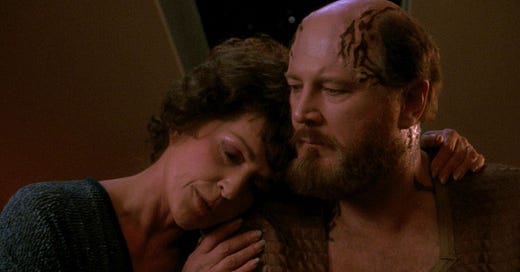



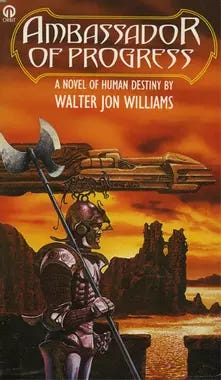
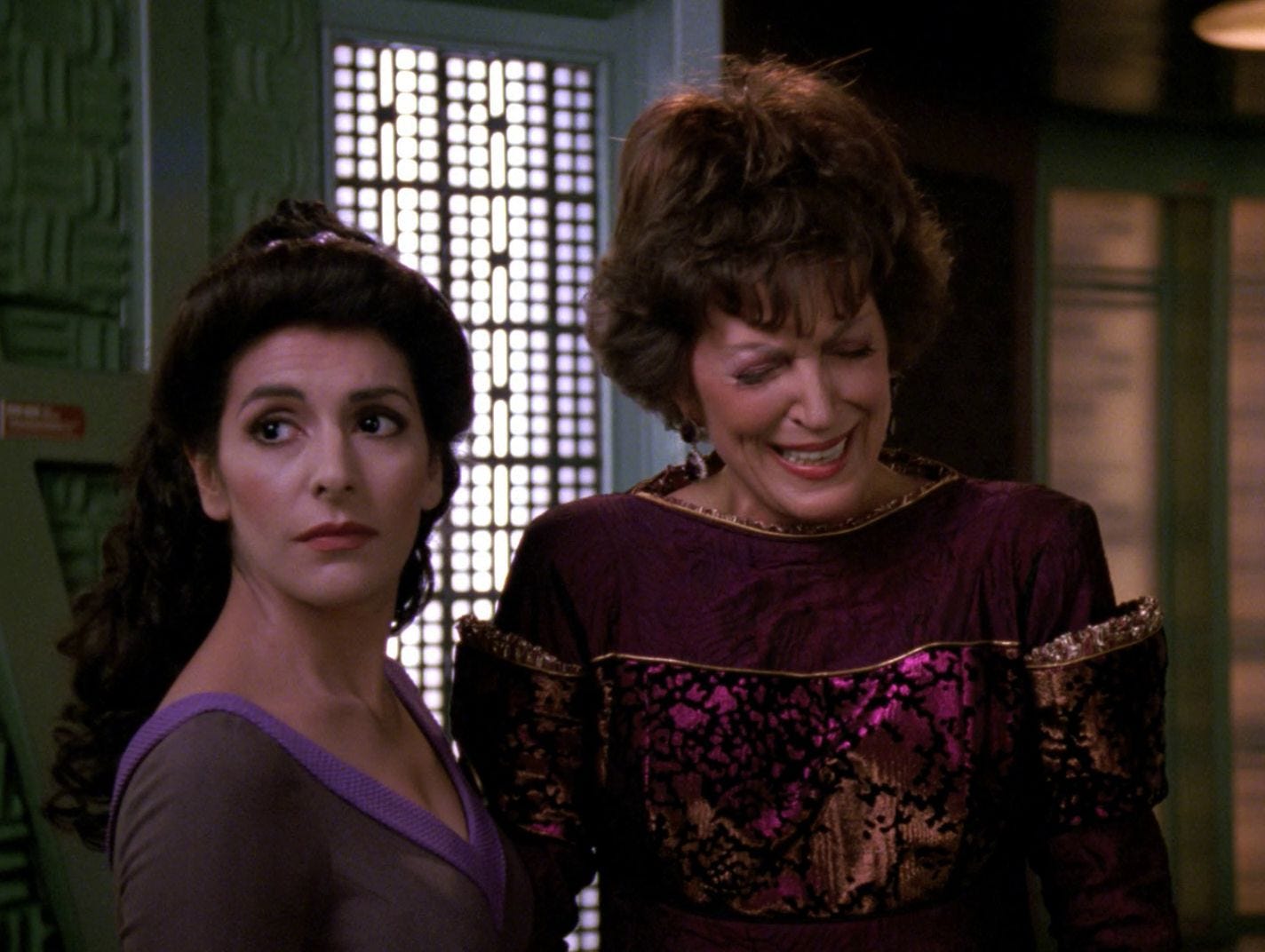
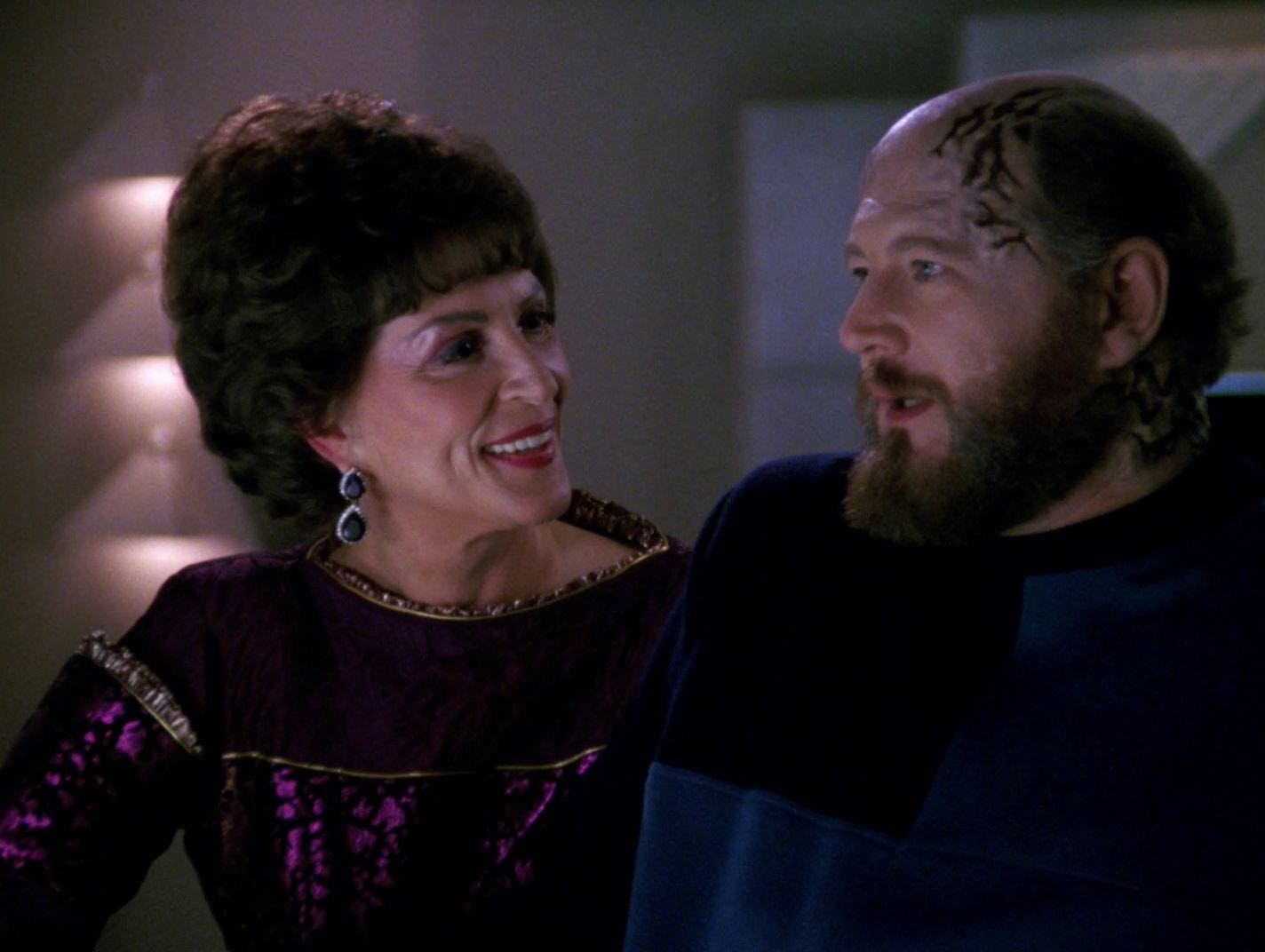
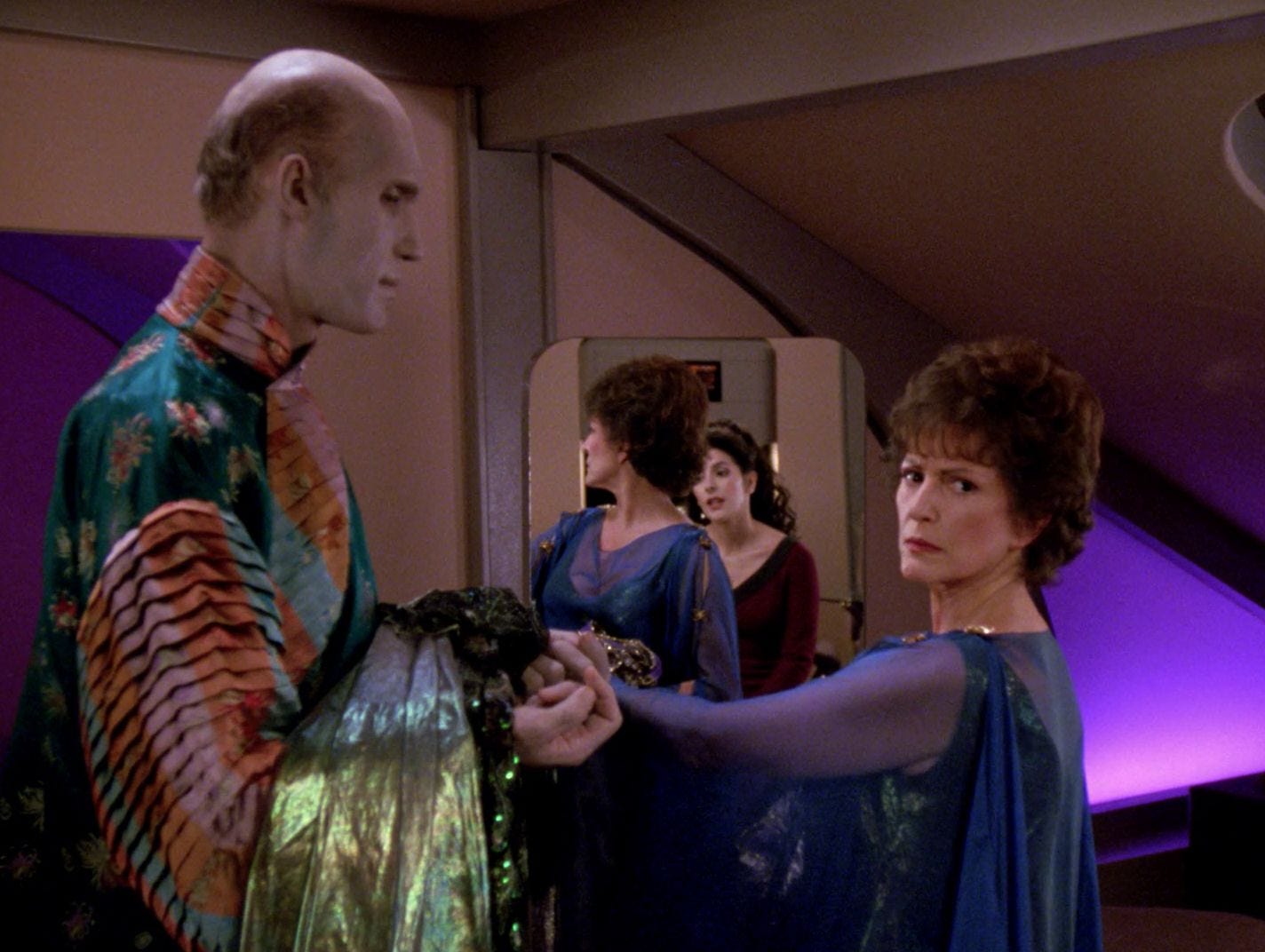
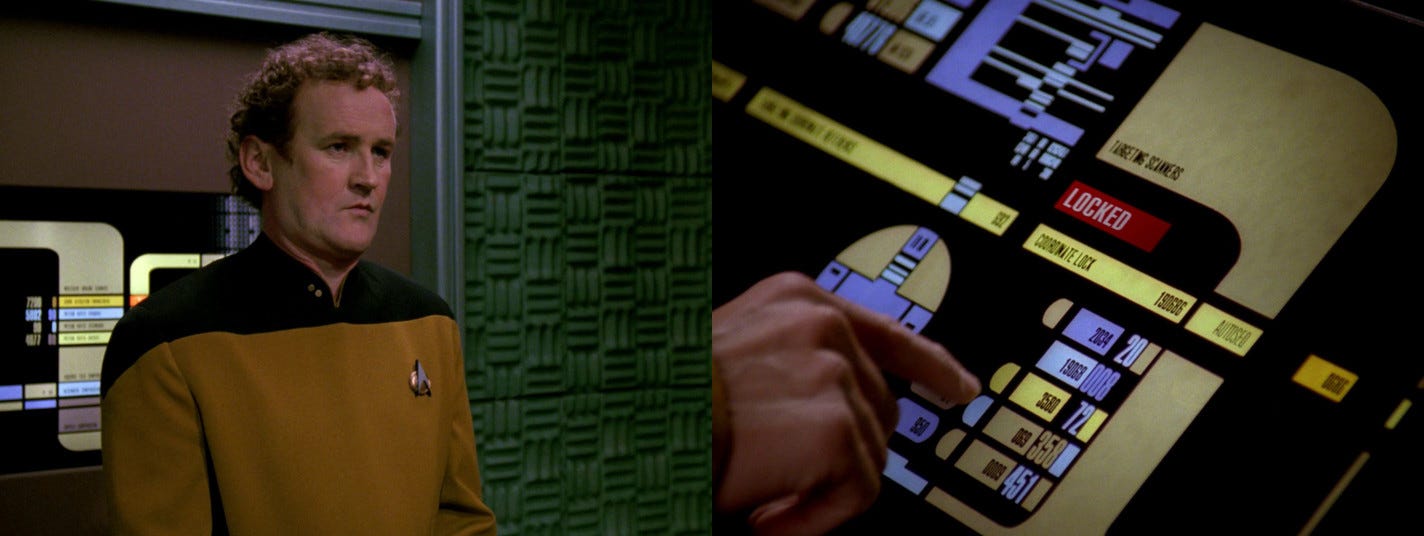
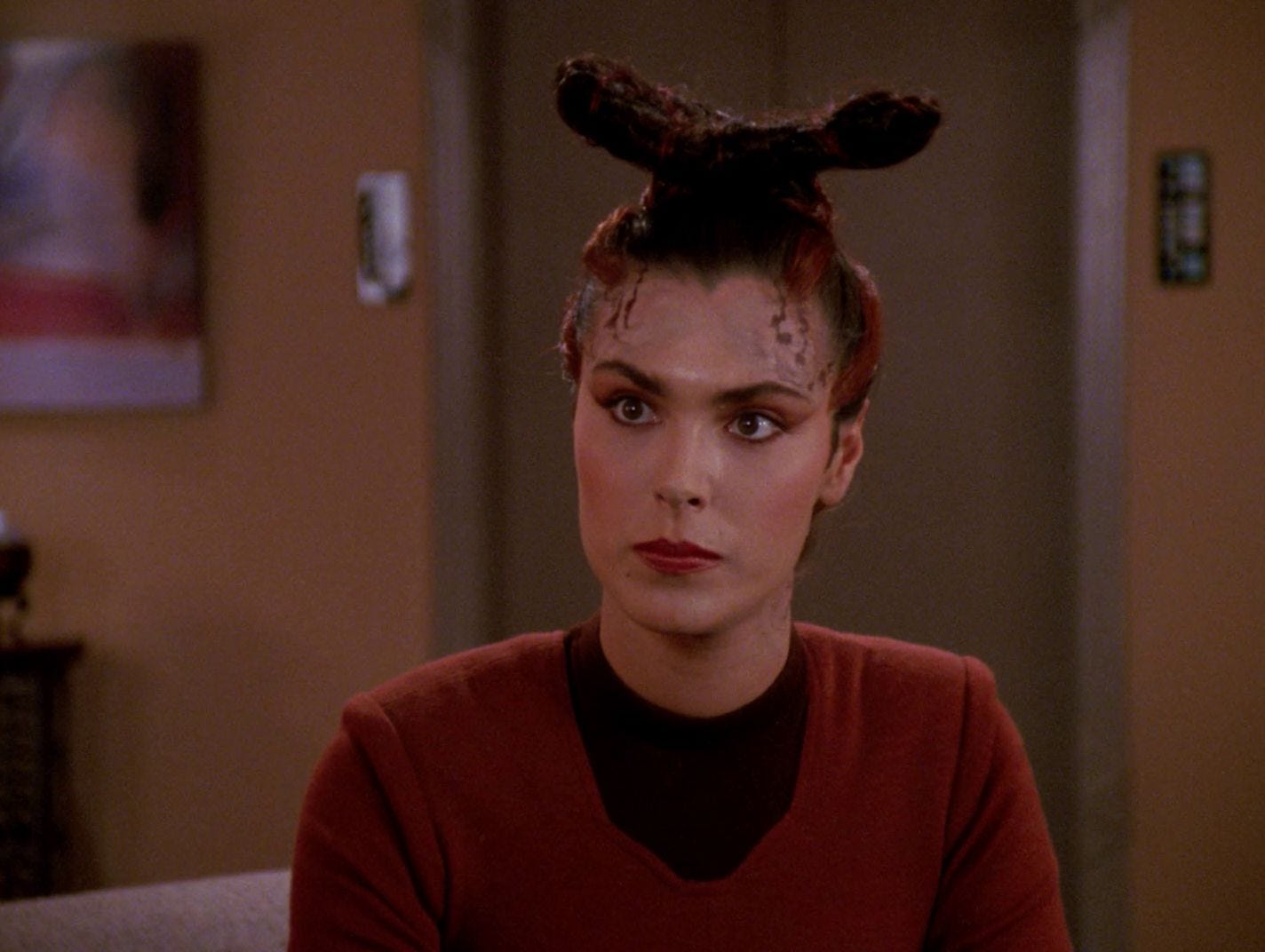
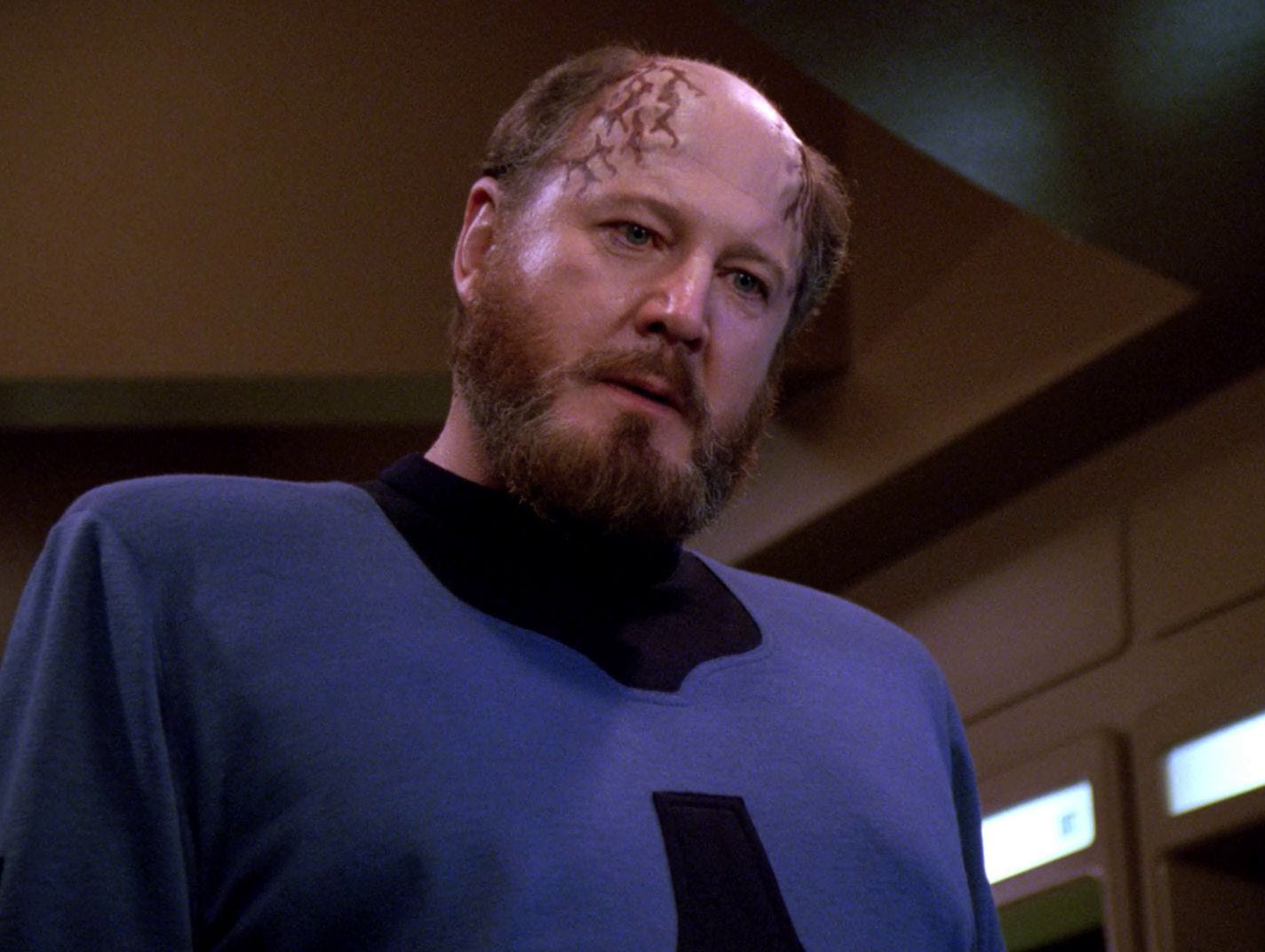
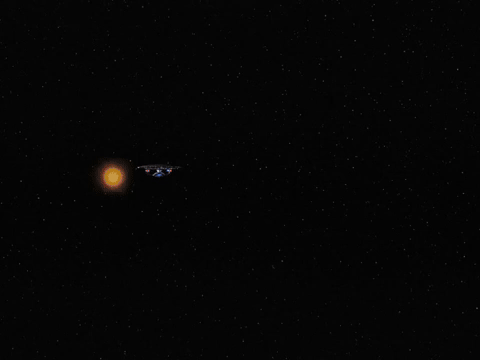
So many TNG episodes are about the balance between respecting culture and trying new things. I like that it surprises us. It's just nice to see characters making their own personal choices. Like when Warf didn't give his blood to that Romulan. This guy decides to go back home and die. Data kills the guy that kidnapped him. Do they make the 'right' decision? How do we deal with it? The show doesn't tell us what's right or wrong, simply what happened. Nice.